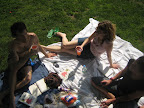 In a collective BookGang misstep, rather than meet at the thematically appropriate Czech Beer Garden in Queens or Brooklyn's beerhall equivalent, Radegast, we convened at Rose's Live Music to discuss I Served the King of England, a novel by the late Bohumil Hrabal, Czech author and pub enthusiast. (With four of us gangsters having traveled to Prague, how'd we get the location so wrong?) As a consequence, we spent the first fifteen minutes critiquing Rose's service, rather than the book. Ironic, given much of the novel's plot involves restaurant service (the title refers to an oft-uttered line by a masterful maitre d').
In a collective BookGang misstep, rather than meet at the thematically appropriate Czech Beer Garden in Queens or Brooklyn's beerhall equivalent, Radegast, we convened at Rose's Live Music to discuss I Served the King of England, a novel by the late Bohumil Hrabal, Czech author and pub enthusiast. (With four of us gangsters having traveled to Prague, how'd we get the location so wrong?) As a consequence, we spent the first fifteen minutes critiquing Rose's service, rather than the book. Ironic, given much of the novel's plot involves restaurant service (the title refers to an oft-uttered line by a masterful maitre d').The protagonist is Ditie, a very short and rather simple character who at the start the book sells weiners for the Golden Prague Hotel, all the while pining for wealth and recognition. The first three-quarters of the book read as hilarious picaresque, as Ditie bounces from one Hotel to another, accruing wealth and a kind of wordly wisdom (and romantic encounters). As our fool kicks around different hotels, he finds himself in the company of eccentric salesmen and poets, hoteliers and politicans - including the President and the Emperor of Ethiopia. The emperor's meal makes a dish like turducken seem sane and humble by comparison. But it's not all laughs: Ditie delivers passages of sheer poetic beauty, as when when he recalls living with his grandmother in a mill, just below a bathhouse frequented by traveling salesmen. The salesmen would often check their old underclothes out the bathouse window. He and his grandmother would wait for these moments; she, to mend the shirts; he, to bask in the unlikely aesthetic beauty that transforms this otherwise mundane moment into one of grace:
"Sometimes shirts that got trhown out would suddenly spread their arms like a traffic cop at an intersection, or like Christ, and the shirts would be crucified in midair for a moment, and then plunge headlong onto the rim or blades of the mill wheel... it was wonderful to see white underwear suddenly fly out of the bathroom window in the Charles Baths and flutter down through the darkness, a white shirt against the black abyss of the current, flashing for an instant outside our window, and float down into the depths to land on the gleaming wet blades."The above image foreshadows the eloquent spiritual lens through which Ditie sees the world in the last third of the book. By that time, has gained and lost his own hotel and fortune, gained and lost a wife and child, and retreated into the remote countryside where he mends roads. His only company at this point are a dog, horse, goat and cat; a strange work crew, but hardly his wildest. Ditie has relinquished his ambitions and now dispenses his distilled wisdom over Urqells at the backwater village where he buys supplies.
"...whenever I was in the pub I realized that the basic thing in life is questioning death, wanting to know how we'll act when our time comes, and that death, or rather this questioning of death, is a conversation that takes place between infinity and eternity, and how we deal with our own death is the beginning of what is beautiful, because the absurd things in our lives, which always end before we want them to anyway, fill us, when we contemplate death, with bitterness and therefore with beauty."And of beauty? "Beauty always points to infinity and eternity."
Dittie's abstract musings contrast sharply against his earlier revelations, like the joys to be found in Paradise, the brothel he frequents as a teenager, just as his voluntary withdrawal into the barren countryside differs from the warmth and human noise of the novel's earlier scenes. (Which, by the way, are hilarious.) The chill and solitude Ditie embraces makes for good discussion, but they also come at a price, for readers anyway: the isolated philosophizing creates narrative drag and, as if to compensate for the freeze on action, Hrabal keeps pointing out various ways in which "the unbelievable came true" - which reads a bit thin, compared the incredible (and incredibly) numerous memorable events that give the young Ditie his formative experience and make the novel one worthy of our highest praise.
-Jason Watt
James Wood, staff writer at the New Yorker and a fine, fine critic, has more to say about the book and its author here.Next: We'll be reading Tolstoy's Anna Karenina, the Pevear / Volokhonsky translation. We'll discuss parts 1-4 on Sunday, December 14th, and parts 4-8 sometime in January. Times and Places TBD.
















